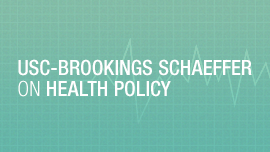This blog is part of the USC-Brookings Schaeffer Initiative for Health Policy, which is a partnership between Economic Studies at Brookings and the University of Southern California Schaeffer Center for Health Policy & Economics. The Initiative aims to inform the national health care debate with rigorous, evidence-based analysis leading to practical recommendations using the collaborative strengths of USC and Brookings. The following is an excerpt of a piece that was published in Health Affairs Forefront on October 25, 2022.
Medicare pays for physician services on the basis of a fee schedule. For many years now, payment rates have not been updated for general inflation. This has left Medicare payment policy vulnerable to the sharp increases in general inflation that are now being experienced. Physicians have already experienced and are likely to continue to face large and permanent declines in inflation-adjusted payment rates in the absence of legislative relief. These sharp current law reductions in effective payment rates could have several undesirable consequences, including barriers to access, disproportionate impact on primary care and specialties that emphasize visits, and acceleration of the shift of physician employment to hospitals.
To ameliorate access problems and related pressures, Congress will have to increase Medicare physician fees, with an initial temporary fix potentially enacted during December’s likely “lame duck” session. Rather than simply increasing physician fees, which will be expensive, Ginsburg and Lieberman write that Congress should require important policy reforms as a condition for providing such “must pass” relief, including revamping the Medicare physician fee schedule, accelerating the shift away from fee for service towards population- and episode-based payment, and linking future annual physician updates to changes in input prices.
Read the full blog in Health Affairs here.
The Brookings Institution is financed through the support of a diverse array of foundations, corporations, governments, individuals, as well as an endowment. A list of donors can be found in our annual reports published online here. The findings, interpretations, and conclusions in this report are solely those of its author(s) and are not influenced by any donation.
The Brookings Institution is committed to quality, independence, and impact.
We are supported by a diverse array of funders. In line with our values and policies, each Brookings publication represents the sole views of its author(s).






Commentary
Multi-year Medicare physician fee freeze threatens access: Pair relief with reforms
October 26, 2022